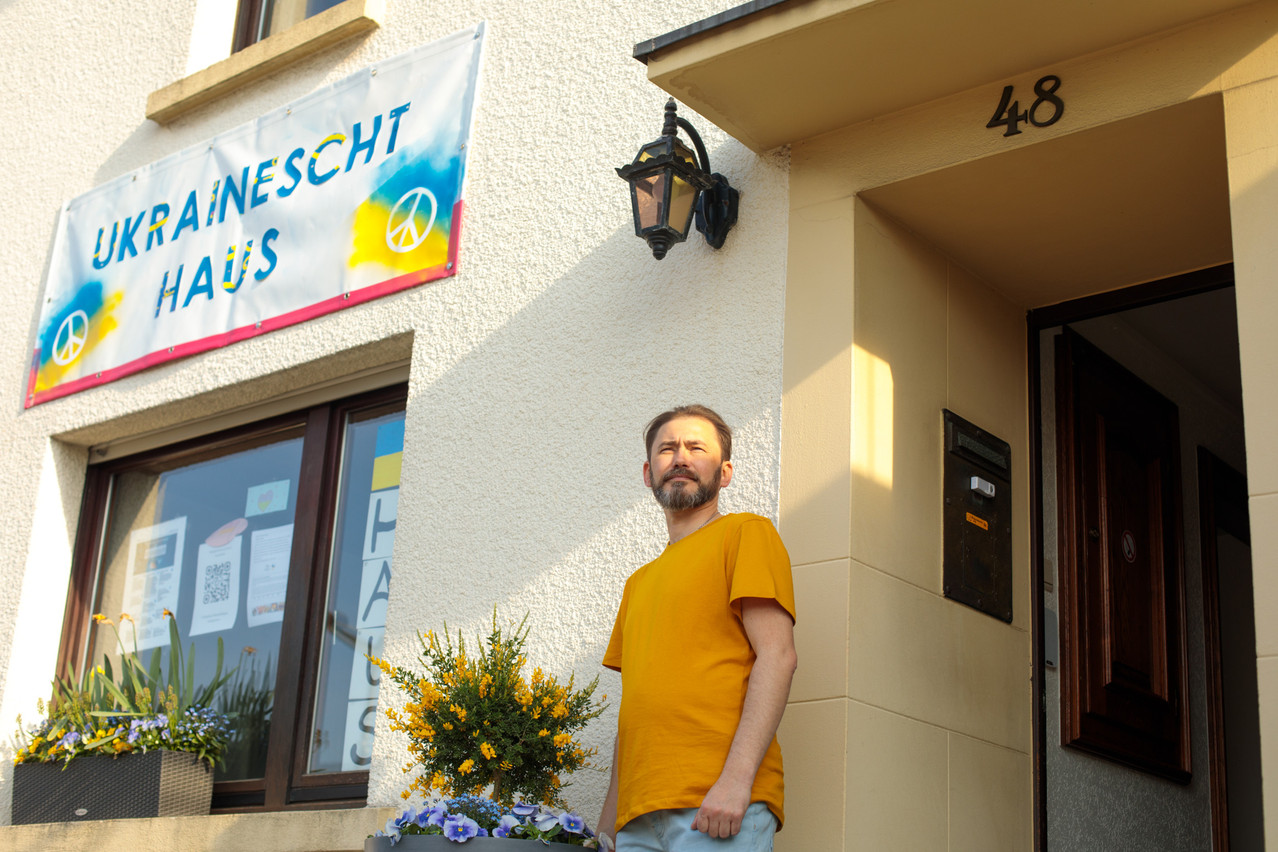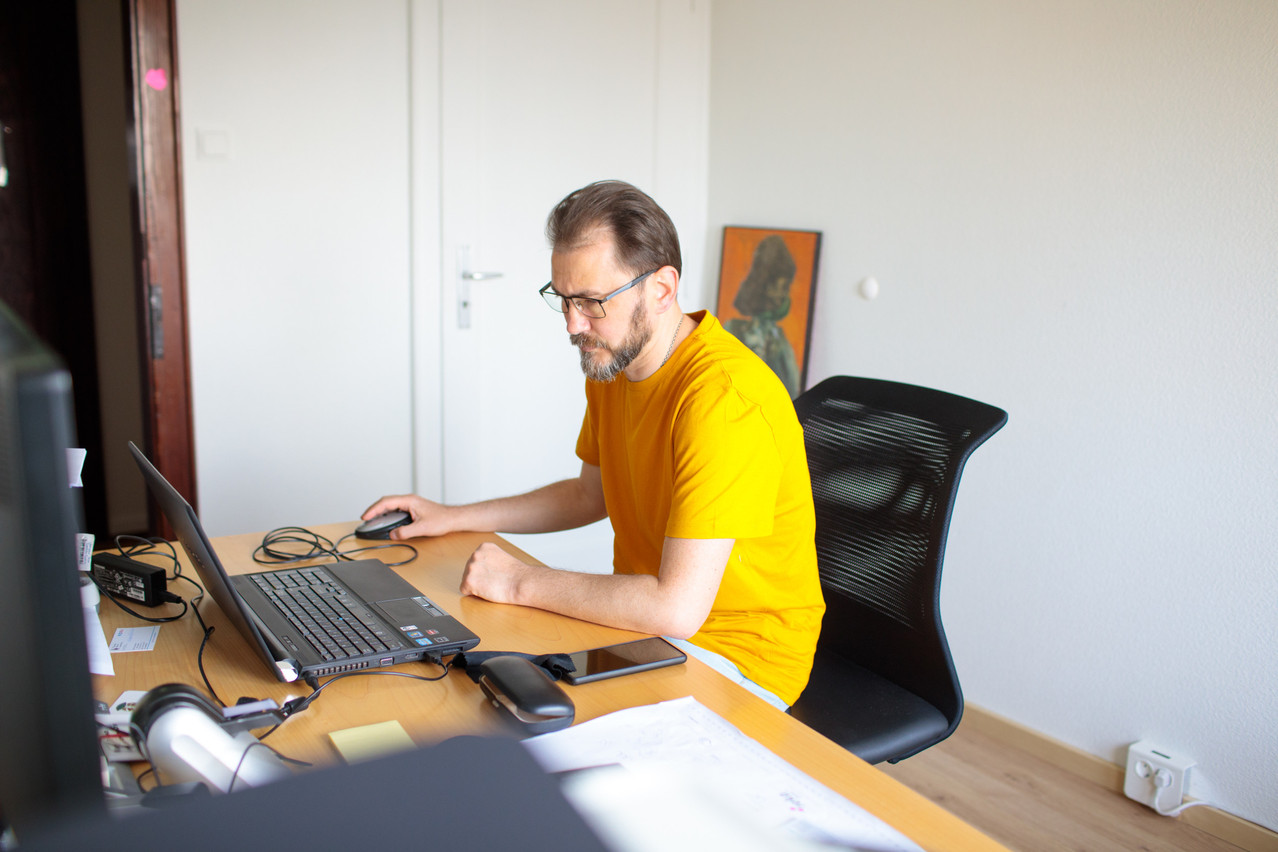Iurii Skobel welcomes us to the as if it were his own home, an initiative by the commune to help connect refugees, collect donations and integrate the new arrivals. Starting with a coffee and a tour of the house through the living room, with its table football area, a room for storing the numerous donations and the kitchen, overlooking the long garden. Several study rooms are set up on the first floor alongside a bathroom and Skobel’s office.
More than 4,500 Ukrainian refugees have come to Luxembourg since the beginning of the war. Around 1,660 had received temporary protection at the start of last week. This status allows them free access to the Luxembourg labour market. Job agency Adem does not have figures on the number of Ukrainians who have already found work in the grand duchy but Skobel is one of them.
A long journey
The 46-year-old has been working since 1 April as the manager of the Ukrainescht Haus. This is a different position from the one he held in Ukraine. “I was a dance teacher at the university,” he says. “I left on the first day of the war.”
Rockets hit the city of Ivano-Frankivsk, where he lived, in Western Ukraine. “I saw the terror in my children’s eyes.” This prompted him to go to Poland with his family as a friend had offered to take them in. Once they reached the border, after driving 250 kilometres, he was asked to turn back. Men were no longer allowed to leave the country and he faced the possibility of being drafted in the military. He left the car keys with his wife and went home.
“The next day I read in the newspapers that there was a change and that if you had three children you could go abroad. I immediately called my son to check with the military.” His family had just spent the night in the car and were still stuck behind all the others at the border. The military confirmed. “Within half an hour I found a way to get to my family”.

The door of the Ukrainescht Haus is wide open on weekdays and Saturdays. (Photo: Matic Zorman/Maison Moderne)
On 26 February, the father, mother and their three children arrived in Poland. A week later, after a long bus journey, they found themselves in Luxembourg. “I was a volunteer at humanitarian aid points in Poland. Volunteers living in Luxembourg had come to deliver goods and had found families willing to take in Ukrainian refugees. We went back with them,” said Skobel. Zakhar, his eldest son, stayed in Poland, where he is studying to become a chef.
A job easily found
Skobel and his wife Natalia, their six-year-old daughter Maria and their 11-year-old son Ostad have been living with their hosts Etienne and Bernadette for a month and a half. “They are a very nice family of pensioners. My children see them as grandparents,” smiles the father.
Skobel had no trouble finding a new job in Luxembourg. He was contacted less than two days after his arrival, directly by the mayor. The mayor offered him to manage the Ukrainescht Haus. At first, on a voluntary basis, until he signed a five-month contract as an employee of the centre for local initiative and management (CIGL). His only colleague is an employee of the municipality of Strassen.
The important thing is that my children are safe.
“Every day, I prepare projects. Activities for the youngest (trips to the zoo, painting), yoga or English classes for the adults. I welcome the Ukrainians who arrive, I help the children. I receive when someone brings food or clothes,” he summarises. This is from 9am to 4.30pm on weekdays and on Saturdays from 10am to 3pm. Between 15 and 20 people come to the Ukrainescht Haus every day.
The municipality of Strassen originally bought the house at 48 Rue des Romains to use as a youth centre. It is a five-minute walk from Etienne and Bernadette’s house.
Folk dancing and Easter traditions
Nothing has been planned for after Skobel's five-month contract. Everything will depend on the evolution of the situation in Ukraine. In the meantime, his wife, who worked as a manager of a cultural centre before the war, has registered with Adem. Their children are due to go to school in Strassen after the Easter holidays. “The important thing is that my children are safe,” says Skobel.
He keeps in regular contact with his relatives in Ukraine. But also with his pupils, to whom he gives lessons via Zoom, several times a week. He would like to teach dancing at Ukrainescht Haus. Before teaching choreography at the university, he taught ballet and folk dance at a special school.
But today’s lesson at the Ukrainian house in Strassen will be about Luxembourg's Easter traditions. At around 10 am, the house gradually fills up with parents and their children. Iurii's daughter Maria also arrives. They all come to attend the Péckvillercher workshop.
This story was first published in French on . It has been translated and edited for Delano.

